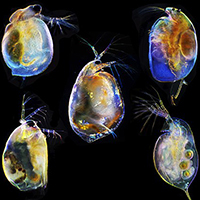Experiments on invertebrate predation on cladocerans and its relationships with lake data

All claims expressed in this article are solely those of the authors and do not necessarily represent those of their affiliated organizations, or those of the publisher, the editors and the reviewers. Any product that may be evaluated in this article or claim that may be made by its manufacturer is not guaranteed or endorsed by the publisher.
Authors
Until recently, knowledge of the impact of invertebrate predators on cladocerans in the Brazilian Lake Monte Alegre was limited to a few species. In order to assess the effects of predation on other cladoceran species, experiments were carried out with different pair-wise combinations of prey species. The experiments tested predation by fourth instar larvae of the dipteran Chaoborus brasiliensis Theobald on neonates and adults of the cladocerans Daphnia gessneri Herbst, Diaphanosoma birgei Kořínek, and Ceriodaphnia richardi Sars, and predation by the water mite Krendowskia sp. on neonates and adults of C. richardi and D. gessneri. In replicated treatments, the prey was offered alone or in combination with neonates and adults of two species and kept in bottles on a plankton wheel under controlled temperature, photoperiod, and light conditions. Chaoborus larvae preyed on neonates of D. birgei and D. gessneri and on adults of the former species. They preyed preferentially on neonates and adults of D. birgei over neonates and adults of C. richardi. The mite Krendowskia sp. preyed on only one species: neonates and adults of D. gessneri. Data on the distribution and strategies of prey in the lake are discussed in light of the experimental results, in an attempt to establish a link between laboratory data and field conditions.
Edited by
Federico Marrone, Dept. of Biological, Chemical, and Pharmaceutical Sciences and Technologies, University of Palermo, ItalyHow to Cite

This work is licensed under a Creative Commons Attribution-NonCommercial 4.0 International License.






